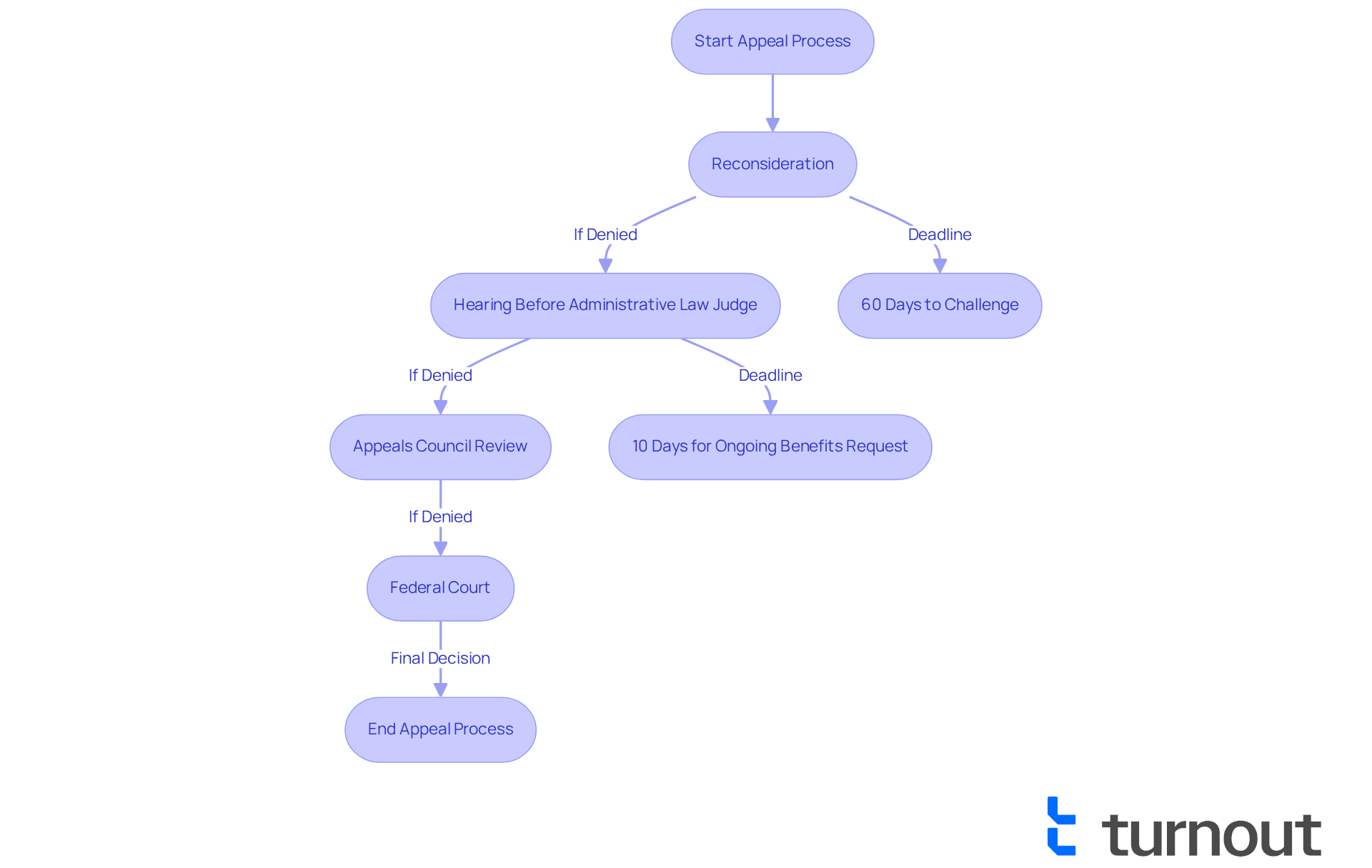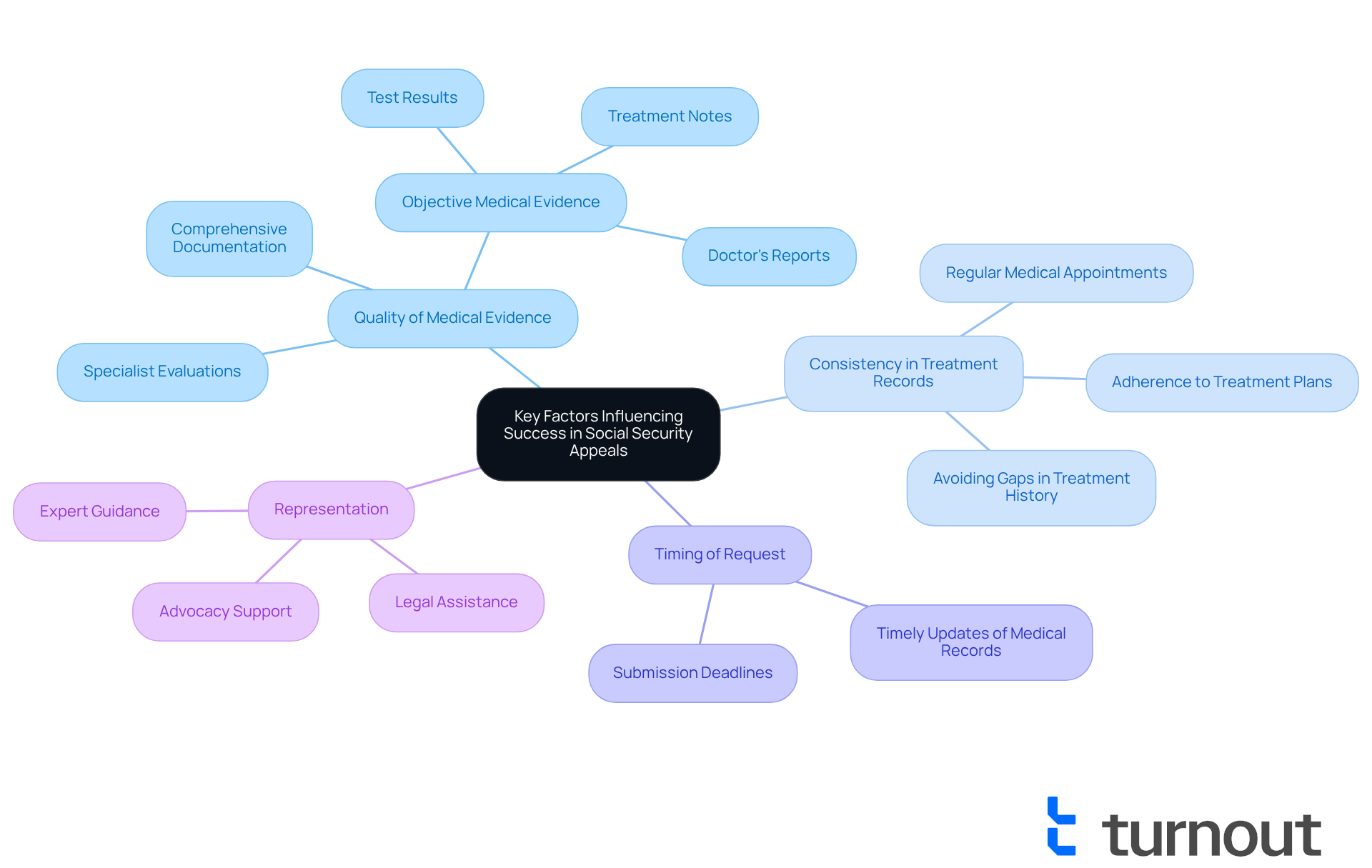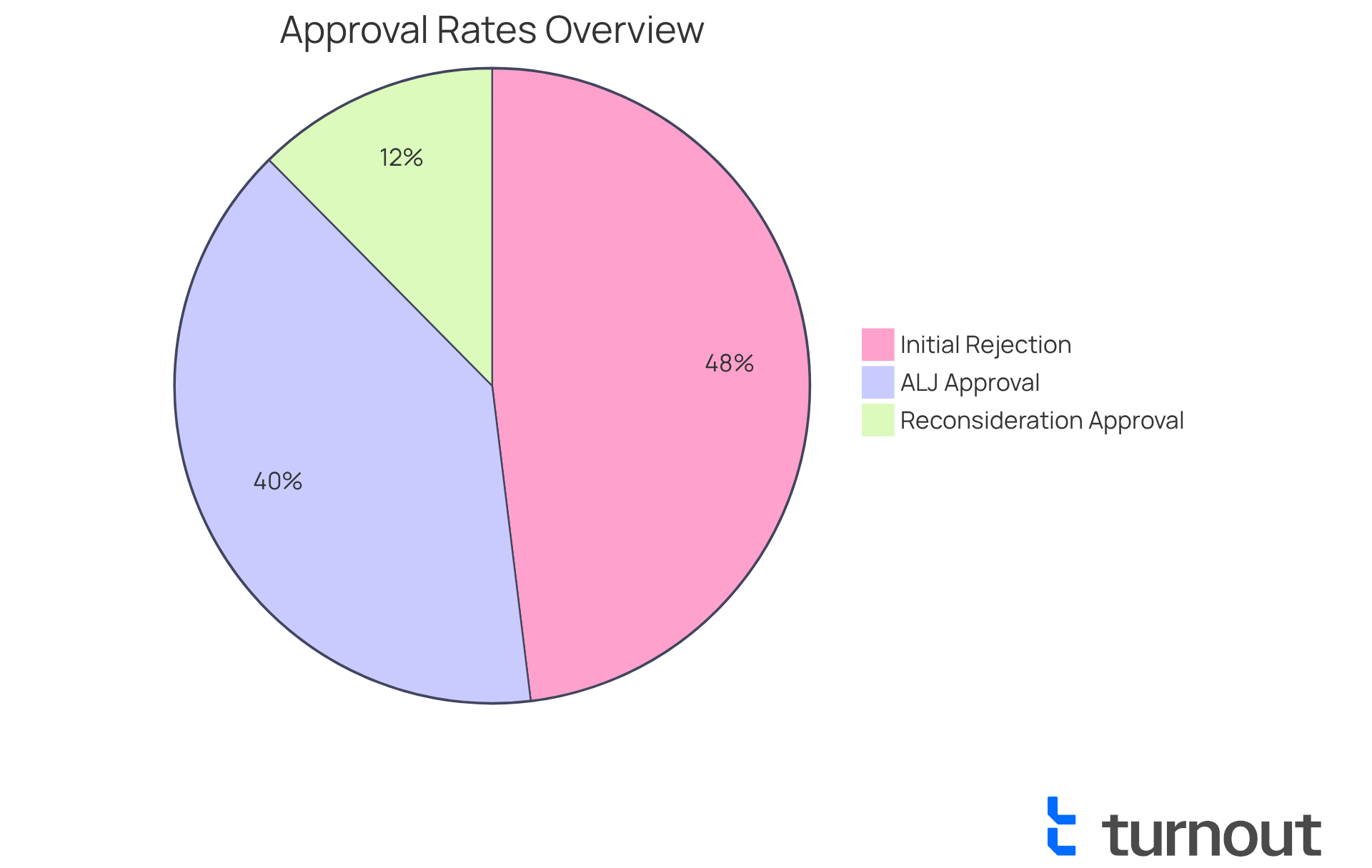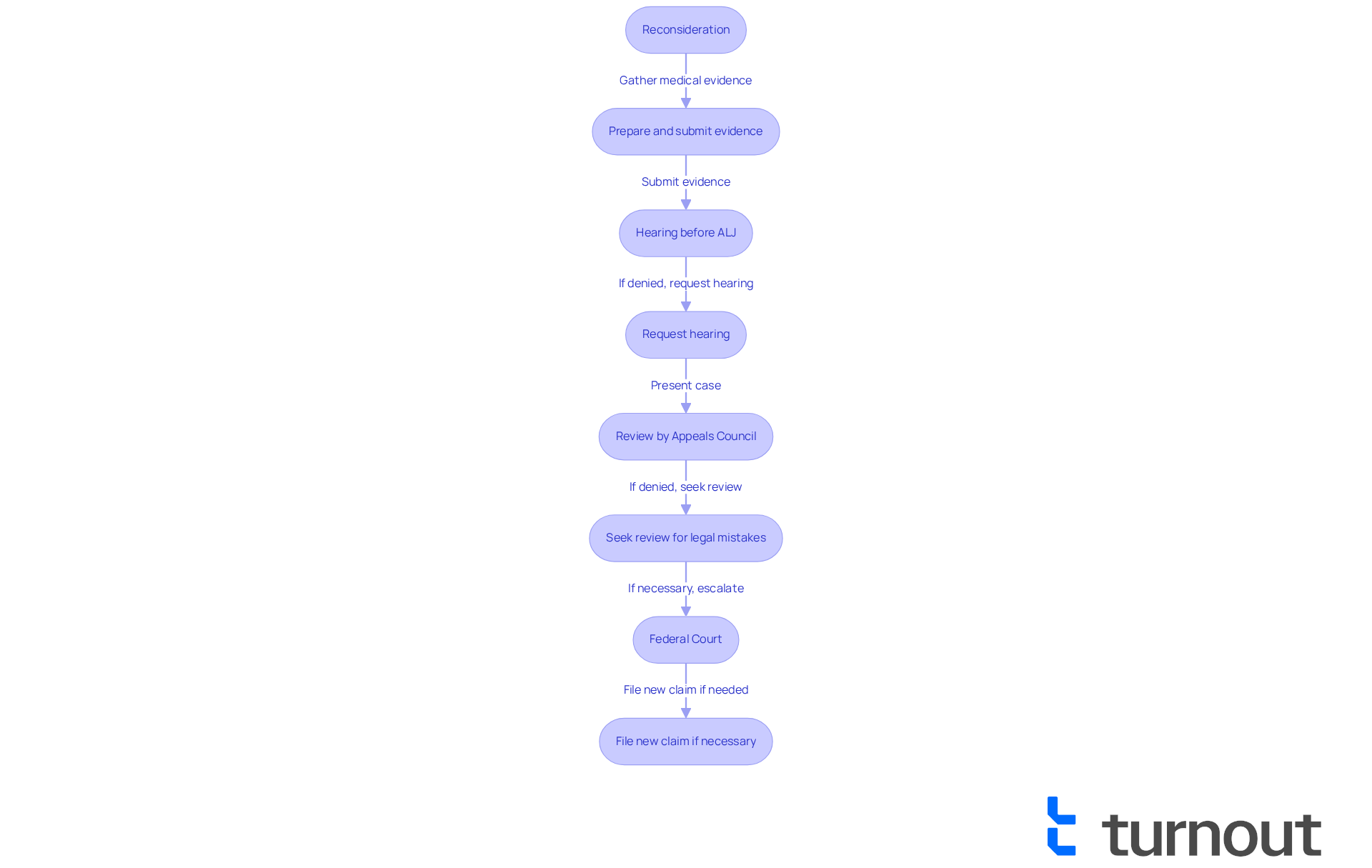Overview
Navigating a Social Security appeal can feel overwhelming, and we understand that the stakes are high. The chances of winning your appeal largely depend on the quality of medical evidence you present and the representation you have during the process. This is where thorough documentation and assistance from trained advocates can make a significant difference.
At the hearing stage, approval rates rise dramatically to 51%. In contrast, at the reconsideration stage, they sit at just 16%. This stark difference highlights how crucial it is to be well-prepared and informed throughout your journey. You are not alone in this process; having the right support can truly enhance your chances of success.
We encourage you to seek out trained advocates who can guide you. Their expertise can help ensure that your case is presented in the best possible light. Remember, being proactive and informed is key to navigating this challenging experience. You're taking an important step by seeking assistance, and that alone can set you on the path to success.
Introduction
Navigating the labyrinth of Social Security appeals can feel overwhelming. We understand that nearly 70% of initial applications for Disability Insurance and Supplemental Income are rejected, which adds to the stress of seeking rightful benefits. Understanding the intricacies of the appeals process isn’t just beneficial—it’s essential for your journey.
This article explores the critical factors influencing the success of Social Security appeals. From the importance of robust medical evidence to the significant role of legal representation, we aim to provide you with the support you need. With so much at stake, you might wonder: how can you effectively enhance your chances of winning an appeal and reclaiming your financial security?
You are not alone in this journey, and we’re here to help.
Defining Social Security Appeals: An Overview
Claims for benefits are the official processes individuals engage in to challenge refusals of their entitlements, including Disability Insurance and Supplemental Income. We understand that facing a rejection can be disheartening. When a benefits application is rejected, the applicant can begin a review through a defined procedure established by the Social Security Administration (SSA). This procedure typically unfolds in multiple phases: it starts with reconsideration, followed by a hearing before an administrative law judge, and may lead to further evaluations by the Appeals Council or even federal court.
Understanding this request system is crucial for individuals seeking to secure their rightful benefits, as it can significantly impact their chances of winning social security appeal, financial security, and overall quality of life. In 2022, around 70% of initial SSDI and SSI applications were rejected, which underscores the chances of winning social security appeal when navigating the reconsideration steps efficiently. Claimants have a 60-day timeframe to submit a challenge after receiving a denial notice, and they can request ongoing benefits during the review if they act within 10 days of the termination letter.
The chances of winning social security appeal often depend on the strength of medical evidence, including updated doctor's notes and new test results that describe how a condition restricts daily activities. For instance, case studies show that individuals who opted for in-person hearings with administrative law judges often improved their chances of winning social security appeal. These settings allow for more effective presentation of evidence, which can make a significant difference. Moreover, the SSA has recently added 12 new conditions to its coverage, which may expedite SSDI decisions for some applicants.
Expert insights highlight that grasping the complexities of the review system can empower individuals to champion their rights effectively. It's common to feel overwhelmed, but remaining knowledgeable about the review system is crucial for individuals encountering economic difficulties and pursuing the aid they deserve. Remember, Turnout is not a law firm and does not provide legal advice; instead, it offers assistance through trained nonlawyer advocates who help clients navigate the SSD claims process without the need for legal representation. We're here to help you every step of the way.

Key Factors Influencing Success in Social Security Appeals
Several essential elements significantly influence the success of social welfare claims. First and foremost is the quality and completeness of medical evidence. Comprehensive documentation—such as test results, treatment notes, and evaluations from specialists—is crucial for demonstrating the severity of a condition. Claims backed by robust medical evidence are more likely to be approved, especially when they clearly illustrate how the condition affects one's ability to work.
At Turnout, we understand that navigating this process can be overwhelming. We do not provide legal advice, but we offer access to trained nonlawyer advocates who can assist you in gathering and presenting this evidence effectively. Consistency in treatment records is another vital aspect. Regular medical appointments and adherence to recommended therapies not only affirm the seriousness of a condition but also help create a reliable account for your request. Gaps in treatment history can raise concerns for the Social Security Administration (SSA), suggesting that the condition may not be as limiting as claimed.
The timing of your request is equally important. It's essential to submit your application within specific deadlines to maintain eligibility. Furthermore, having representation during the review process can greatly enhance your chances of success. Knowledgeable nonlawyer advocates from Turnout can navigate the complexities of the system, ensuring that all necessary documentation is submitted and that your case is presented compellingly.
Statistics show that requests with expert assistance experience significantly improved success rates. For instance, at the Administrative Law Judge (ALJ) hearing stage, the approval rate for requests can rise to 51%. This underscores the impact of competent representation. By understanding these elements, you can enhance your requests and improve your chances of winning social security appeal to obtain the benefits you rightfully deserve. Remember, you are not alone in this journey; we are here to help.

The Role of Legal Representation in Winning Appeals
Navigating the benefits dispute system can feel overwhelming, and it’s completely understandable to seek support during this challenging time. Having informed advocates by your side can significantly enhance your chances of success. Turnout connects you with trained nonlawyer advocates who are well-versed in the intricacies of the system. They understand the specific documentation required and the nuances of effectively presenting your case.
These compassionate specialists assist you in gathering essential medical records, preparing for hearings, and ensuring compliance with all procedural requirements. Research shows that individuals who engage experienced advocates often see their chances of winning social security appeal increase, particularly at the Administrative Law Judge (ALJ) hearing level, where the approval rate has reached an encouraging 51%. In contrast, only 16% of cases are approved at the reconsideration stage, highlighting the critical importance of representation.
Moreover, in 2024, a staggering 62% of all requests for Disability benefits were rejected at the initial application phase. This statistic underscores the difficulties many applicants face throughout their journey. The assistance provided not only alleviates the stress associated with the review system but also ensures that you are well-prepared to present your case effectively, ultimately enhancing your likelihood of receiving the benefits you deserve.
Additionally, Turnout's contingency fee structure allows you to seek representation without any upfront costs, addressing concerns about affordability. Case studies reveal that those who receive help from knowledgeable advocates have better chances of winning social security appeal and achieving favorable outcomes. Remember, you are not alone in this journey; we’re here to help you navigate this complex system with compassion and expertise.

Navigating the Social Security Appeal Process: Stages and Strategies
Navigating the Social Security reconsideration process can feel overwhelming, but we’re here to help. This journey involves several distinct stages, each requiring specific actions and strategies. The first stage is reconsideration, where a different examiner reviews the initial decision. If the request is denied again, the next step is to ask for a hearing before an administrative law judge (ALJ). During this hearing, applicants can present their case, provide additional evidence, and respond to questions. If the ALJ rejects the claim, the applicant can seek review from the Appeals Council, which examines the case for any legal mistakes. Finally, if necessary, the case can be escalated to federal court.
We understand that staying organized and meeting all deadlines is crucial throughout this process. Gathering comprehensive medical evidence to support your claims is essential, as common reasons for denial often stem from incomplete documentation. Effective communication and thorough preparation can significantly enhance the chances of winning a social security appeal. Did you know that in 2024, 84% of Social Security Disability cases were rejected at the reconsideration stage? This statistic emphasizes the significance of a thoroughly prepared challenge to increase the chances of winning social security appeal. Having strong evidence and a clear explanation of how your condition limits your work capabilities can greatly enhance your chances of winning a social security appeal.
The typical length of each phase can differ, and it’s important to be ready for an extended procedure. The reconsideration stage typically takes several months, while hearings before an ALJ can take additional time due to scheduling and case backlogs. Effective strategies involve understanding the particular standards applied by the Administration to assess disabilities and ensuring that all medical documentation distinctly records the diagnosis. By taking proactive steps and staying informed about legislative changes, including anticipated adjustments to SSDI eligibility criteria and benefit calculations in 2025, you can better navigate the complexities of the Social Security appeal process. Remember, you are not alone in this journey.

Conclusion
Understanding the intricacies of the Social Security appeal process is essential for individuals seeking to secure their rightful benefits. We recognize that the journey from initial rejection to potential approval can feel overwhelming. However, by familiarizing yourself with the appeal system and the importance of strong medical evidence, you can significantly enhance your chances of success.
Key factors influencing the outcome of Social Security appeals include:
- The quality of medical documentation
- Adherence to treatment
- Timely submission of requests
- The presence of knowledgeable advocates
It's common to feel uncertain, but statistics show that claims supported by comprehensive evidence and expert assistance experience markedly higher approval rates, especially at the Administrative Law Judge hearing stage. This underscores the necessity of being well-prepared and informed throughout the appeal process.
Ultimately, the path to winning a Social Security appeal can be daunting, but you are not alone in this journey. Engaging with trained nonlawyer advocates can provide invaluable support, alleviating stress and ensuring that your case is presented effectively. By taking proactive steps and remaining informed, you can empower yourself in your pursuit of the benefits you deserve. Remember, we're here to help you every step of the way.
Frequently Asked Questions
What is the process for appealing a Social Security benefits denial?
The process for appealing a Social Security benefits denial typically unfolds in multiple phases: it starts with reconsideration, followed by a hearing before an administrative law judge, and may lead to further evaluations by the Appeals Council or even federal court.
How long do claimants have to challenge a denial of benefits?
Claimants have a 60-day timeframe to submit a challenge after receiving a denial notice. Additionally, they can request ongoing benefits during the review if they act within 10 days of the termination letter.
What factors can influence the chances of winning a Social Security appeal?
The chances of winning a Social Security appeal often depend on the strength of medical evidence, including updated doctor's notes and new test results that describe how a condition restricts daily activities.
Are in-person hearings beneficial for Social Security appeals?
Yes, case studies show that individuals who opted for in-person hearings with administrative law judges often improved their chances of winning their Social Security appeal, as these settings allow for more effective presentation of evidence.
What recent changes have been made to Social Security coverage?
The SSA has recently added 12 new conditions to its coverage, which may expedite SSDI decisions for some applicants.
What resources are available for individuals navigating the Social Security claims process?
Turnout offers assistance through trained nonlawyer advocates who help clients navigate the SSD claims process without the need for legal representation. They provide support throughout the appeals process but do not offer legal advice.




